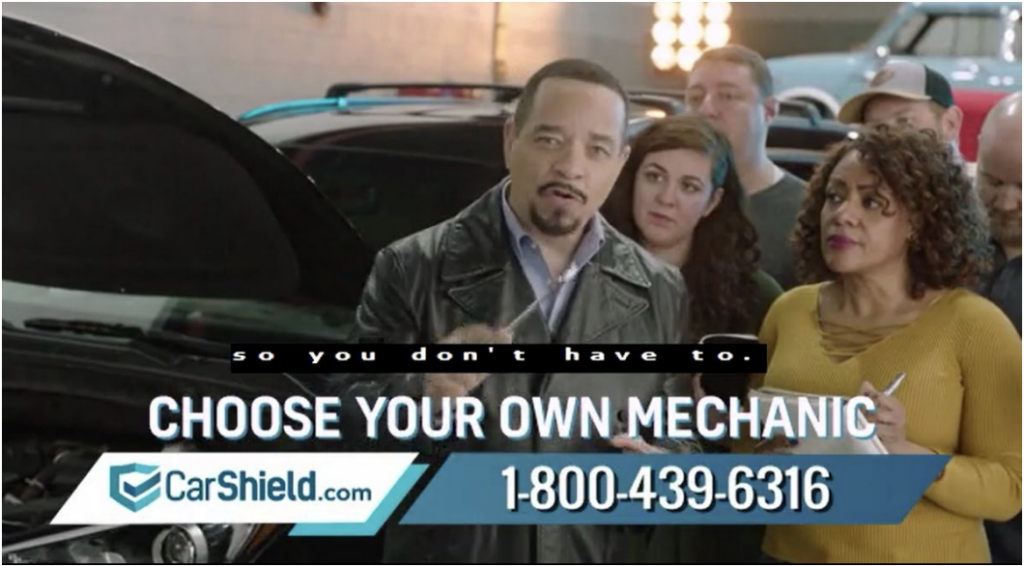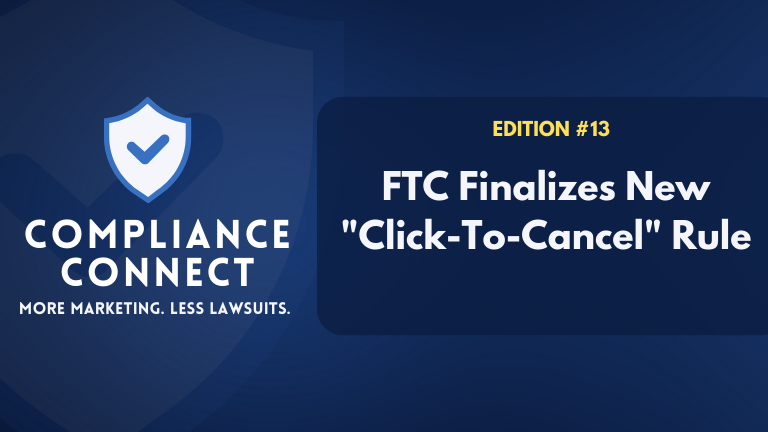Good morning! This is the thirteenth edition of the Compliance Connect newsletter.
The goal is simple: to keep you in the loop on what the FTC and other regulatory agencies are up to so that you can protect yourself.
These newsletters will land in your inbox twice a week – Mondays and Thursdays.
Remember: this is NOT legal advice, only information!
Here’s the rundown today…
- 🔄 FTC Mandates Easy Cancellation
- 💡 Company Sued Over 120% Price Match Guarantee
- 🚗 Why Did Carshield Settle For $10 Million With The FTC?
- 📞 How Big Is The Do Not Call Registry?
- 🛠️ The Other Tool The FTC Uses To Collect Fines
Compliance Digest: What You Should Read Today
FTC Finalizes New “Click-To-Cancel” Rule
The FTC has introduced a “click-to-cancel” rule to make canceling recurring subscriptions as simple as signing up.
This rule addresses the problem of companies making it difficult for consumers to end memberships, which can lead to unwanted charges.
Check out this useful fact sheet
Specifically the rule forces businesses to get informed consent before charging customers and provide a simple mechanism to cancel the negative option feature and immediately halt charges, among other provisions.
The rule applies to most “negative option” offers, which automatically charge customers for services unless they actively cancel.
The rule goes into effect 180 days after publication in the Federal Register.
Lamps Plus To Pay $4.1 Million To Settle False Price-Matching Claims
When it comes to compliance, the FTC isn’t the only game in town.
Lamps Plus, a lighting and home furnishings retailer, settled for $4.1 million over allegations of false advertising tied to its unusually strong 120% price-match guarantee.
Prosecutors from multiple California counties filed the lawsuit, claiming that the policy applied only to Lamps Plus’ own branded products, effectively avoiding real competition and misleading consumers.
The investigation began when a consumer protection official noticed that Lamps Plus refused to honor the price match when he went to purchase a lamp, sparking further scrutiny.
The settlement bars Lamps Plus from misleading advertising practices, though it doesn’t provide refunds to affected consumers.

Case Breakdown: Carshield
In July the FTC announced a settlement with CarShield. This company sells vehicle service contracts.
The defendants agreed to pay $10 million to settle allegations from the FTC that their advertising was deceptive.
The FTC claims that CarShield misled consumers about the extent of coverage provided under their vehicle service contracts and that the celebrity endorsements featured in their ads, including by Ice-T, made false assurances regarding the benefits of these contracts.
Getting On The FTC’s Radar
In the FTC’s complaint, the agency hints at what got Carshield on their radar, including…
- A Better Business Bureau alert in 2021
- Scrutiny by the states of Missouri and Georgia
- Customer complaints to the FTC
Misleading Claims
The impression given by CarShield’s marketing is that if you have coverage and your car needs a repair, it will be easy to get that repair and you will only need to pay your deductible.
Nevertheless, many customers were surprised that certain repairs were not covered. Even if they were, they were not able to get those repairs done at the facility of their choice.
Some customers also reported not getting the promised rental car while their repairs were ongoing.
Despite being promised “peace of mind,” many customers found themselves paying for repairs that they reasonably believe should’ve been covered.
Telemarketing Violations
As we talk about all the time, the FTC is particularly aggressive about enforcing telemarketing violations with their Section 19 authority.
All sales were done over the phone, which means that the misleading claims Carshield was accused of making fell under the Telemarketing Sales Rule.
If you sell over the phone, you need to make sure you are squeaky clean.
Celebrity Endorsements
Carshield featured celebrities in their advertisements, including Chris Berman, Ice-T, Vivica A. Fox, Adrienne Janic, and Ernie Hudson.
While some of these endorsers technically had policies, they didn’t use them for repairs.
Others did use their policies for repairs but were approved for repairs that Carshield would not have approved for other customers.
If you use endorsements, particularly by well-known figures, make sure they accurately reflect the endorser’s true experience with the product.
Also, be TRANSPARENT about their relationship with your product.
Vulnerable Groups
In the complaint the FTC highlights a call where a 90 year old was persuaded to keep their coverage by an aggressive sales person.
This is a reminder that the FTC is particularly sensitive to marketing towards vulnerable groups such as the elderly.
Here is a link to the complaint.
Did You Know…
249,498,621 people were registered on the National Do Not Call Registry in 2023.

Quick Compliance Tip: Notices Of Penalty Offenses
Until 2021, the primary way that the FTC tried to get refunds for customers was by using Section 13(b) authority, which was pretty broad.
In 2021, the Supreme Court weakened the FTC’s ability to use Section 13(b).
After that ruling, the FTC pivoted. One tool they use is Section 19 authority, which allows them to collect for telesales violations.
Another tool they use are Notices Of Penalty Offenses.
The Penalty Offense provision was established in 1975 to strengthen the FTC’s enforcement capabilities. The FTC largely stopped using this authority in the 1980s, favoring Section 13(b).
After 13(b) was taken away, they’ve gone back to using them.
So how does it work?
Notices of Penalty Offenses are warnings the FTC sends to businesses to inform them about practices deemed illegal or deceptive in past cases.
If someone continues these practices after receiving a notice, the FTC can sue them for civil penalties – essentially, fines – for each violation.
Here’s how it works to collect money:
Step 1: Warning Sent
The FTC sends a notice that lists specific practices the FTC has ruled against before.
This gives businesses a heads-up that continuing these actions could lead to fines.
Step 2: Knowledge of Violations
By receiving the notice, the business or individual is considered to have “actual knowledge” that these practices are illegal.
If they do the same things again, it’s easier for the FTC to hold them accountable.
Step 3: Fines for Violations
If the FTC catches them continuing these unfair or deceptive practices, it can take them to court and ask for fines. Each violation can result in a penalty of up to $43,792.
In short, the notices are a way for the FTC to warn businesses and then fine them if they ignore the warnings and break the rules.
